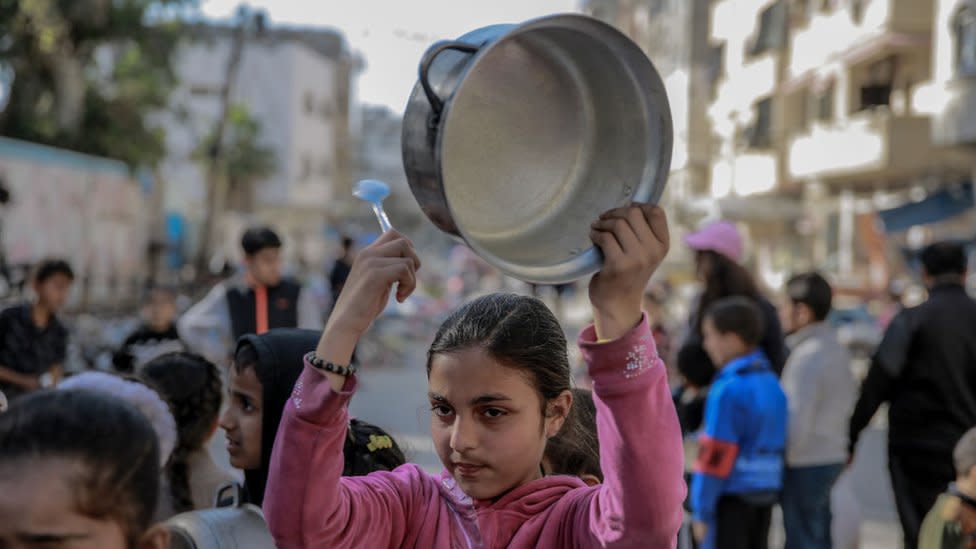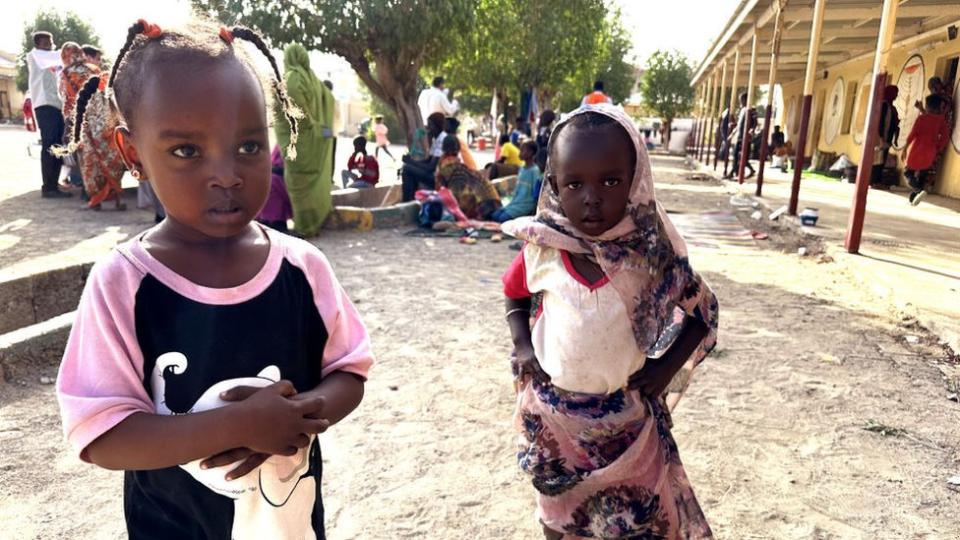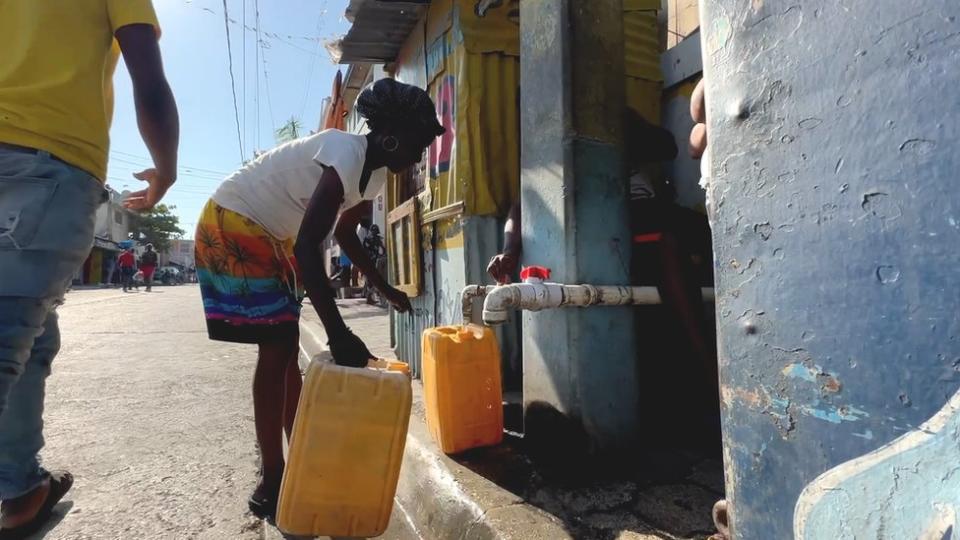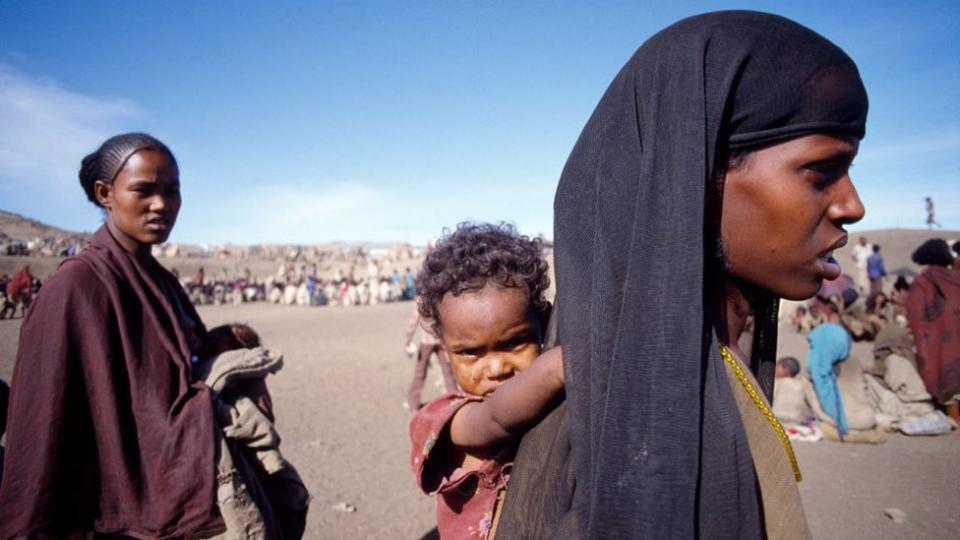What is famine, when is it declared and why are Gaza and Sudan at risk?

Millions of people in Gaza are on the brink of famine as they struggle to access food.
The United Nations (UN) has also warned that the ongoing conflict in Sudan could trigger the world's largest hunger crisis.
What is famine and when is it declared?
Famine occurs when a country has such a severe food shortage that its population faces acute malnutrition, starvation, or death.
The status is generally declared by the United Nations (UN), sometimes in conjunction with the country's government, and often alongside other international aid organisations or humanitarian agencies.
It is decided using a UN scale called the Integrated Food Security Phase Classification (IPC).
This ranks a country's food shortages - or insecurity - against five "phases" of severity, with famine the fifth and worst.
For a famine to be officially declared, three things need to happen in a specific geographical area:
at least 20% of households face an extreme lack of food
at least 30% of children suffer acute malnutrition
two adults or four children per 10,000 people die each day "due to outright starvation or to the interaction of malnutrition and disease"
Why are Gaza and Sudan at risk of famine?
According to the UN, famine is imminent in northern Gaza, and could occur any time up to May 2024. It follows months of conflict between Israel and Hamas in Gaza after the 7 October Hamas attacks on Israel.
Half the population - about 1.1m people - are starving, according to the IPC classification. In the worst-case scenario, the entire population of Gaza will be in famine by July 2024.
The UN said Gaza had the "highest share of people facing high levels of acute food insecurity that the IPC initiative has ever classified for any given area or country".
Its most senior human rights official, Volker Türk, told the BBC that Israel bore significant blame for the crisis in Gaza, and there was a "plausible" case that it was using starvation as a weapon of war. Israel has vehemently denied this.
Oxfam has accused Israel of "deliberately blocking and/or undermining the international humanitarian response in the Gaza Strip".
It warns that people living in Gaza "will suffer mass death from disease and starvation far beyond the current 31,000 Palestinian war casualties," unless Israel changes its approach.
The UN has increased pressure on Israel to fulfil its legal responsibilities to protect Palestinian civilians and allow adequate supplies of humanitarian aid into the region.
Israel insisted it was letting in all the aid offered, and accused agencies of failing to distribute it.

Elsewhere, UN officials warned that the ongoing conflict in Sudan has plunged the country into "one of the worst humanitarian nightmares in recent history", which could trigger the world's largest hunger crisis.
According to the UN's World Food Programme (WFP), nearly 18 million people in Sudan are facing acute food insecurity as a result of the civil war which broke out in April 2023.
Unicef said it had seen malnutrition among young children "beyond the worst projections", as well as outbreaks of cholera, measles and malaria.
Which other countries are at risk of famine?
The Humanitarian organisation Action Against Hunger said several other countries also have "very concerning levels of hunger".
These include Afghanistan, the Democratic Republic of Congo, Ethiopia, Pakistan, Somalia, Syria and Yemen.

In March 2024, the WFP warned that Haiti - which is experiencing a severe political and economic crisis amidst spiralling gang violence - was "on the edge of a devastating hunger crisis".
About 1.4m people there are categorised as being on the verge of famine, with another three million at the level below. The IPC's description of Haiti's food security situation is "alarming".
What causes famine?
According to the IPC, famine and extreme food crises have multiple causes, which can be man-made, nature-driven, or a combination of both.
Action Against Hunger said conflict remains the "key driver of hunger around the world".
In Sudan, it blamed the war for insufficient food production and resulting high prices.
It also said the ongoing conflict in Gaza was preventing lifesaving food, fuel and water entering the territory.
The IPC highlighted humanitarian organisations' "near-complete lack of access" to most of Gaza.
The International Rescue Committee (IRC) said drought and crop failures caused by extreme weather events as a result of climate change were leading to widespread food shortages, particularly in East Africa.
El Niño - a climate pattern that describes the unusual warming of surface waters in the Pacific Ocean - has already impacted food supplies in Southeast Asia and Latin America.
What difference does an official declaration of famine make?
The declaration of famine does not unlock specific funding.
However, it often triggers a large international response from other UN agencies and international governments, who can provide food supplies and emergency funding.
Some humanitarian agencies like the IRC provide malnutrition treatments. Oxfam has worked with partners in Gaza to distribute vouchers and cash for food and hygiene items.
The WFP is working in Sudan to restore infrastructure like roads and schools. It also has mobile response teams that travel to remote areas to deliver food and other assistance.
Many agencies typically start to plan and deliver aid before a famine has been declared in order to avoid the worst effects - usually when a country has been given a phase three classification or above.
Where have famines previously been declared?
The last time famine was officially declared was in South Sudan in 2017.
Nearly 80,000 people faced starvation and another million were on the brink of famine after three years of civil war.
At the time, the UN blamed the effects of war on agriculture. Farmers lost livestock, crop production was severely curtailed, and inflation soared.

Previous famines include southern Somalia in 2011, southern Sudan in 2008, Gode in the Somali region of Ethiopia in 2000, North Korea in 1996, Somalia in 1991-1992 and Ethiopia in 1984-1985.
Between 1845 and 1852, Ireland suffered a period of starvation, disease and emigration that became known as the Great Famine.
About one million people are thought to have died when the country's potato crop - which fed a third of the population - was destroyed by disease. Food exports continued to Great Britain, which ruled the island of Ireland at the time.

